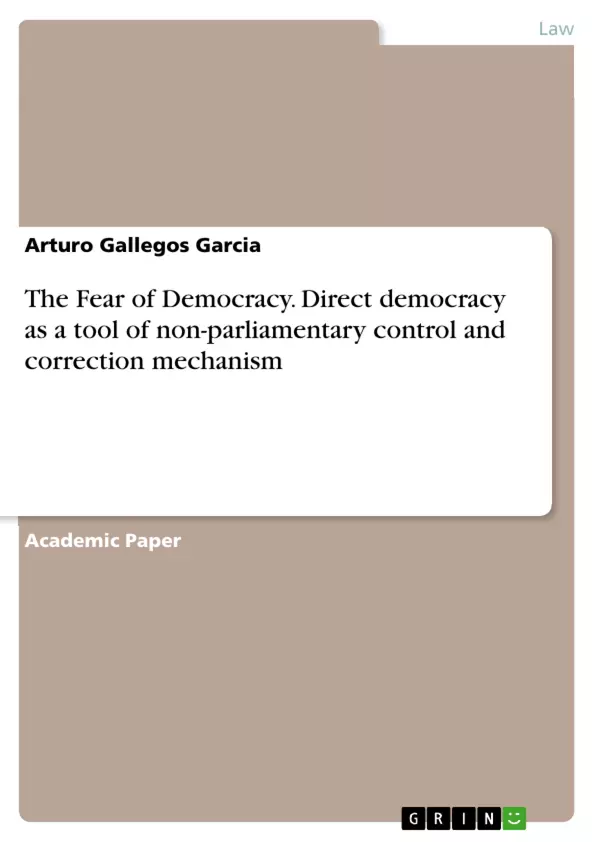Ever since the establishment of today´s well known democratic free elections and its indirect representation´s system, the question of checks and balances has been raised. The institutional approach to the problem of balance between the government and the people lays on the parliament as representative of the late. Sadly the ever more intricate relationship between government, parliaments and pressure groups had let the people without efficient tools of control over the government. This research tries to explore both parliamentary and non-parliamentary control mechanisms and to explain why is it that the first is unable to accomplish its task and the later a much more effective and democratic tool is. Special attention is to be set over direct democracy as the only control mechanism in which the people can express its will not through a collectivist form but as an individual, making this form of participation the most democratic and legitimate.
The electoral process to form a parliament and the control mechanisms that the later possess above the executive are both regarded as a synonym for democracy. However, such mechanisms have many flaws of both procedure and nature. Little research has been done in the science of law about alternative mechanisms of control, the so called “non-parliamentary controls”. This paper explores the advantages of these, such as the media, public opinion, pressure groups, etc., but specially direct democracy through referendums and plebiscites. This is done by comparative research were a highly developed European Parliamentary System (Germany) is to be confronted with an underdeveloped Latin American presidential system (Mexico), coming to the conclusion that both systems could be very benefitted from a higher degree of direct democracy. The inclusion of this form of participation should be a requirement of any modern society to consider itself as democratic.
Inhaltsverzeichnis (Table of Contents)
- Democracy as an ongoing struggle
- The problem of the perception of democracy
Zielsetzung und Themenschwerpunkte (Objectives and Key Themes)
This research explores parliamentary and non-parliamentary control mechanisms in democratic systems, highlighting the limitations of traditional representative democracy and the potential of direct democracy as a more effective and democratic tool for citizen control over government.
- The historical evolution of democratic struggles
- The limitations of representative democracy and parliamentary control mechanisms
- The potential of direct democracy as a tool for citizen control
- The role of direct democracy in safeguarding individual rights and legitimacy
- The ongoing process of democratization and its potential for improvement
Zusammenfassung der Kapitel (Chapter Summaries)
- Democracy as an ongoing struggle: This chapter delves into the historical evolution of democratic principles and their application, tracing the struggle for democracy from ancient Greece and Rome to the present day. It examines the ideas of prominent thinkers like Plato, Aristotle, and Socrates, emphasizing the challenges and limitations of early democratic models. The chapter also highlights the ongoing process of democratization and the need for constant vigilance in safeguarding democratic principles.
- The problem of the perception of democracy: This chapter explores various conceptions of democracy, emphasizing the importance of a multi-perspective approach to understanding its meaning and significance. It examines the exercise of sovereignty and its connection to different interpretations of democracy, highlighting the challenges and opportunities associated with different forms of democratic participation.
Schlüsselwörter (Keywords)
The main keywords and focus topics of this text are: direct democracy, control mechanisms, government legitimacy, referendum, plebiscite, checks and balances, parliamentarism, sovereignty, democratic participation, and historical evolution of democracy.
Frequently Asked Questions
What is the main focus of this research?
The research explores parliamentary and non-parliamentary control mechanisms in democratic systems, with a special emphasis on direct democracy as a tool for citizen control over government.
Why are traditional parliamentary controls considered insufficient by the author?
The author argues that the intricate relationship between governments, parliaments, and pressure groups has left citizens without efficient tools to monitor and control government actions effectively.
What are "non-parliamentary controls"?
These include alternative mechanisms such as the media, public opinion, pressure groups, and most importantly, direct democracy through referendums and plebiscites.
How does the research compare different countries?
The paper uses a comparative approach, contrasting the highly developed parliamentary system of Germany with the presidential system of Mexico.
What is the significance of direct democracy in this context?
Direct democracy is seen as the only mechanism where people can express their will as individuals rather than through collectivist forms, making it highly legitimate and democratic.
What is the "Fear of Democracy" mentioned in the title?
It refers to the historical and institutional resistance towards giving citizens direct power, often rooted in the fear that direct participation might destabilize established political structures.
- Arbeit zitieren
- Arturo Gallegos Garcia (Autor:in), 2018, The Fear of Democracy. Direct democracy as a tool of non-parliamentary control and correction mechanism, München, GRIN Verlag, https://www.hausarbeiten.de/document/455070


